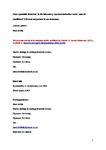Does repeatable behaviour in the laboratory represent behaviour under natural conditions? A formal comparison in sea anemones
| dc.contributor.author | Osborn, A | |
| dc.contributor.author | Briffa, Mark | |
| dc.date.accessioned | 2016-12-01T10:16:03Z | |
| dc.date.issued | 2017-01-20 | |
| dc.identifier.issn | 0003-3472 | |
| dc.identifier.issn | 1095-8282 | |
| dc.identifier.uri | http://hdl.handle.net/10026.1/8059 | |
| dc.description.abstract |
Animal personality studies rely on collecting repeated behavioural data either in the field or under laboratory conditions. Conditions in the field should be far less stable than controlled laboratory conditions, and hence represent a potential source of variation in behaviour. Here we report on the first experiment to our knowledge that formally compares the repeatability of identical behaviours in the laboratory and the field, and across the transition from laboratory to field. Using a design that controls for observation number we compared two groups of sea anemones, observed across two experimental phases, either (1) in the field followed by the laboratory or (2) in the laboratory only. We analysed differences in behaviour across a range of levels including repeatability and its between- and within-individual variance components. Although mean startle response durations varied between the laboratory and field, there was no significant difference in repeatability across situations. Within-individual variance differed between the two periods of the experiment for animals observed only in the laboratory but this effect was not present for those that transitioned from field to laboratory. Furthermore, the rank order of individual responses was stable for animals observed only in the laboratory but changed for those that transitioned from field to laboratory. These results show that although repeatability estimates in the laboratory can yield results like those obtained in the field, the underlying components of consistent variation in behaviour might be influenced by an interaction between prior experiences and the current situation in which the animals are observed. | |
| dc.format.extent | 197-206 | |
| dc.language | en | |
| dc.language.iso | en | |
| dc.publisher | Elsevier BV | |
| dc.subject | Actinia equina | |
| dc.subject | animal personality | |
| dc.subject | field | |
| dc.subject | IIV | |
| dc.subject | laboratory | |
| dc.subject | repeatability | |
| dc.title | Does repeatable behaviour in the laboratory represent behaviour under natural conditions? A formal comparison in sea anemones | |
| dc.type | journal-article | |
| dc.type | Journal Article | |
| plymouth.author-url | https://www.webofscience.com/api/gateway?GWVersion=2&SrcApp=PARTNER_APP&SrcAuth=LinksAMR&KeyUT=WOS:000391840900022&DestLinkType=FullRecord&DestApp=ALL_WOS&UsrCustomerID=11bb513d99f797142bcfeffcc58ea008 | |
| plymouth.volume | 123 | |
| plymouth.publication-status | Published | |
| plymouth.journal | Animal Behaviour | |
| dc.identifier.doi | 10.1016/j.anbehav.2016.10.036 | |
| plymouth.organisational-group | /Plymouth | |
| plymouth.organisational-group | /Plymouth/Faculty of Science and Engineering | |
| plymouth.organisational-group | /Plymouth/Faculty of Science and Engineering/School of Biological and Marine Sciences | |
| plymouth.organisational-group | /Plymouth/REF 2021 Researchers by UoA | |
| plymouth.organisational-group | /Plymouth/REF 2021 Researchers by UoA/UoA04 Psychology, Psychiatry and Neuroscience | |
| plymouth.organisational-group | /Plymouth/Research Groups | |
| plymouth.organisational-group | /Plymouth/Research Groups/Marine Institute | |
| plymouth.organisational-group | /Plymouth/Users by role | |
| plymouth.organisational-group | /Plymouth/Users by role/Academics | |
| plymouth.organisational-group | /Plymouth/Users by role/Researchers in ResearchFish submission | |
| dcterms.dateAccepted | 2016-10-06 | |
| dc.rights.embargodate | 2017-12-1 | |
| dc.identifier.eissn | 1095-8282 | |
| dc.rights.embargoperiod | 12 months | |
| rioxxterms.versionofrecord | 10.1016/j.anbehav.2016.10.036 | |
| rioxxterms.licenseref.uri | http://www.rioxx.net/licenses/under-embargo-all-rights-reserved | |
| rioxxterms.licenseref.startdate | 2017-01-20 | |
| rioxxterms.type | Journal Article/Review |


